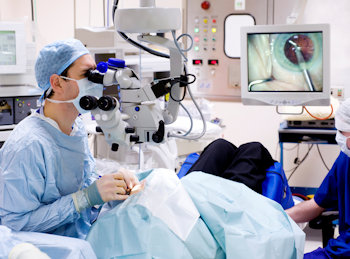Early Signs of Cataracts
If you have noticed a deterioration of your vision and quality of life, you may have the early signs of cataracts. Cataracts can worsen over time and, if left untreated, can cause you to lose some of your eyesight. Schedule an appointment with a specialist at Elmquist Eye Group and explore your options.

Do You Have a Cataract?
Cataracts are cloudy areas in the normally clear lens of the eye, the part of the eye responsible for focusing light and producing clear, sharp images. Cataracts affect one in six Americans over the age of 40.
Although most cataracts are age-related, you don’t have to be a senior citizen to get one. Individuals can have an age-related cataract in their 40s and 50s, but they are usually small and do not affect vision. It is after the age of 60 that cataracts are most responsible for diminished vision.
If your vision is getting cloudy, if you are losing your color perception or are having trouble with night vision, you may be in the early stages of developing cataracts. Other signs may include trouble reading or seeing in the distance, blurred or double vision, glare or haloes from lights, and frequent changes in prescription for your eyeglasses or contact lenses.
The first evidence of a cataract is usually detected during a cataract evaluation. The dilated eye exam typically includes a visual acuity test that measures how well you see at various distances, tonometry that measures the pressure inside the eye, and a special magnifying lens that helps the eye doctor examine your retina and optic nerve for signs of cataract and other eye problems.
If cataracts are beginning to form, it’s important to make sure your glasses or contact lenses are strong enough to compensate for your impaired vision. As your cataracts develop further, Dr. Rodriguez will discuss with you whether surgery would be beneficial.
How are Cataracts Treated?
Cataracts cannot be treated with medicines, vitamins or eye drops. Surgery is the only proven treatment. During cataract surgery, the clouded lens is removed and replaced with a customized, artificial lens called an intraocular lens (IOL).
Cataract surgery is one of the safest and most highly perfected surgical procedures in medicine, with a 95% success rate. Of course, as with any surgery, risks do exist and should be discussed with your Elmquist eye doctor before the procedure.
If you have questions about the early signs of cataracts or about cataract surgery, the doctors at Elmquist Eye Group are among the best qualified to answer them. Get in touch with us today at (239) 936-2020 to schedule an evaluation.
